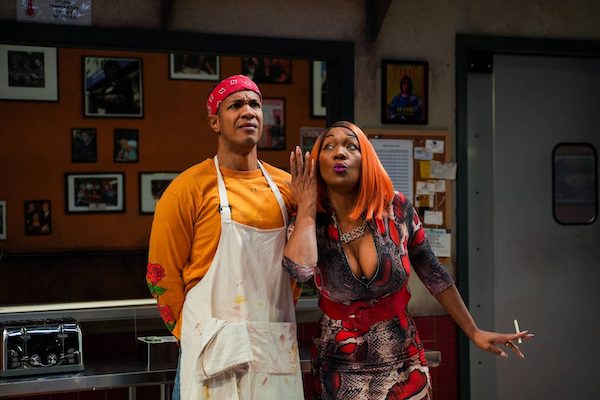Theater Review: “Clyde’s” – An Exhilarating Food Fight
By Robert Israel
The Huntington Theatre Company’s co-production of Lynn Nottage’s Clyde’s is spirited and sassy.
Clyde’s, by Lynn Nottage. Directed by Taylor Reynolds. Co-produced by Huntington Theatre Company and the Berkeley Repertory Theater. Staged by the Huntington Theatre Company at 264 Huntington Ave., Boston, through April 23.

Wesley Guimarães and April Nixon in the Huntington Theatre Company’s presentation of Clyde’s. Photo: Muriel Steinke.
Playwright Lynn Nottage delivers a sock-o punch with Clyde’s. The show — which makes its Boston appearance at the Huntington Theatre Company after having been staged in San Francisco, New York, and Chicago — is the best production I have seen so far this season. And, while it has many comedic moments, it has been mistakenly marketed as a comedy. My take: disregard the reassuring label. The HTC production features a lively and athletic cast of five who transform a vibrant set by Wilson Chin into a raucous battle zone. If the text could be summed up in one word, call it … picaresque: the characters are rogues who bear combat scars thanks to the volatile lives they’ve chosen to live, the desires they pursue. A predictable laugh riot it is not.
Playwright Nottage, at 58, has been awarded two Pulitzer Prizes for Drama (Ruined in 2009 and Sweat in 2017). She has also penned an opera, a musical, others plays, and films. As an undergraduate at Brown University, she was a student of playwright Paula Vogel, who admonished student playwrights “to never romanticize the theater.… There’s a battle out there. Think of yourselves as generals.” Nottage took that note seriously. She has taken military command in Clyde’s. Her campaign is devoid of sentiment. And she takes no prisoners.
Nottage tells us that she has set the play in a “truck stop sandwich shop in Berk County, Pennsylvania.” We meet, at the opening curtain, Montrellous (Harold Surratt), who may or may not be trying to seduce Clyde (April Nixon), the owner/lead warrior of the place. He thinks of himself as a “sandwich sensei” and he’s trying to lure Clyde into his orbit by way of his exotic creations. The ambiguity here is intentional. The theme of sexual politics is amplified by drawing on the seductive nature of food. But Montrellous knows that Clyde, hardened by life’s impetuous twists and tumults, will be hard to please.
Clyde’s is not a fancy-schmancy place: it reminded me of Koerner’s Lunch, formerly located on Aborn Street near the industrial neighborhood of the Providence of my youth. At my greasy spoon, short order cooks plied their trade using (unwashed) bare hands, pressing the fixings into soggy slices of bread with their palms before serving it to the customers. Food is treated similarly in this play. Montrellous and the other kitchen staff entertain pipe-dreams about creating designer sandwiches, but Clyde isn’t buying these upmarket desires. She has no time for foreplay. She wants hard core action.
The way Clyde sees it, she’s given the cooks jobs and she wants results. The kitchen crew also share a common thread — they have served time behind bars for sundry misdeeds, so they can be replaced if they don’t produce. The owner tells Montrellous, “I’m not indifferent to suffering. But I don’t do pity. I just don’t. And you know why? Because dudes like you thrive on it, it’s your energy source, but like fossil fuels it creates pollution.”
The cast is top-notch throughout. As Rafael, Wesley Guimarães takes the stage with a marvelous light-stepping force, wielding a knife and wisecracks with aplomb. The object of his desire, Letitia (Cyndii Johnson), is alternately lulled and repelled by his confident overtures and sweet talk. Will the two ever get it on? And Louis Reyes McWilliams, in a difficult role, makes Jason an excellent foil: he is the new guy, a bit of a dunderhead who is compelled to think out his moves if he is going to keep his job in a pecking order that could be scrambled up at any moment.
If Nottage can be accused of a fault in this play it is not standing outside of her characters, letting them take on an independent life. Occasionally, one senses the dramatist’s polished voice infusing itself into the action, running interference. This generates some dramatic inconsistency: there is a clash between her command of language — it is a recognizably cultivated pitch — and her characters’ traffic in rough-hewn banter. That said, there is the converse issue: her characters lob a multitude of f-bombs throughout. She might consider trimming the use of these (and other vulgarities). The excess profane verbiage becomes numbing, dulling our awareness of the dramatic tension and the characters’ frustrations.
That noted, the HTC’s co-production is spirited and sassy. You might not want to order a sandwich at Clyde’s. But you will want to stay to watch the show.
Robert Israel, an Arts Fuse contributor since 2013, can be reached at risrael_97@yahoo.com.
Tagged: Clyde’s, Huntington-Theatre-Company, Lynn Nottage, Taylor Reynolds

